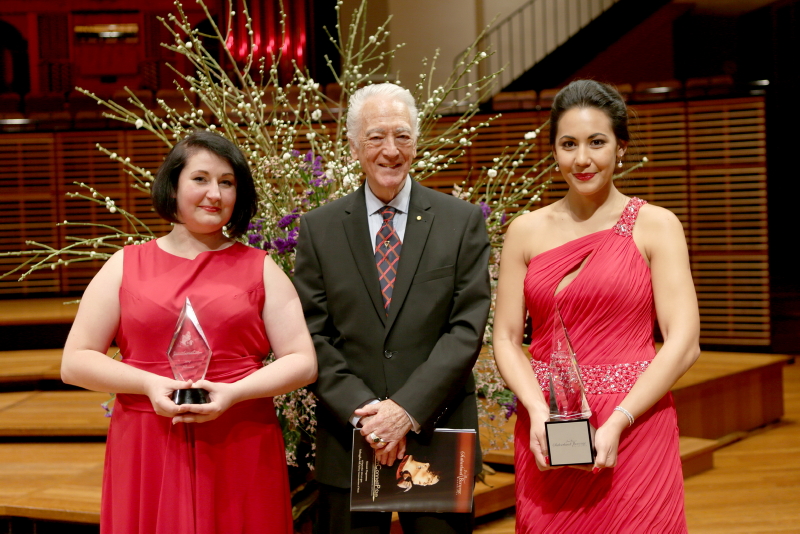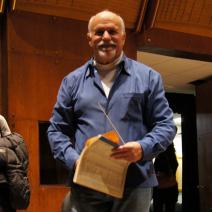The power of Tosca – Christian Badea talks about his lifelong friendship with the Roman woman

Christian Badea chuckles as he confesses that he has known Tosca all his life. The Romanian born US based conductor is in Sydney again for Opera Australia, rehearsing John Bell’s production of the Puccini opera which opens here in early July. Just last year, the graduate of the Juilliard School, Grammy Award winning conductor and past- director of the Spoleto Festival was in Sydney conducting a large orchestra via CCTV in Opera Australia’s presentation of Korngold’s Die Tote Stadt. Delightfully, he is presently in this city as he receives a Helpmann Award nomination for Best Music Direction for his work in this opera.
Chorus Master Michael Black’s office has been commandeered for our conversation, and winding down after the morning’s rehearsal with the principals and the production team , Christian Badea reflects on his early encounters with opera. “The person who started me in music was an uncle of mine, who gave me my first violin. He was also a very good singer and he brought me into this wonderful world.”
This was the beginning of Christian Badea’s approach to opera, which is a prism of many perspectives. He has sung since the age of 5. “I was in a children’s chorus and I saw operas from behind the scenes which fascinated me because it was like a magic box.” Having studied the violin at the Juilliard School, he has firsthand knowledge of instrumental technique. ” I can ask players to play in a certain in a way because I am a violinist and I know how to explain things technically ” he says.
In a surprise revelation, he then admits that rather than belonging to a Conductors Guild, he is a ‘fully fledged’ member of the Directors Guild in the US, having staged (and conducted) his own production of Tosca. This, he believes, is the right way to start “because then you understand every motivation of every musical line and vice versa.” He speaks passionately about the dramatic tradition in his country of birth. “In Romania the theatre tradition is extremely strong and I had the opportunity to learn many things in the theatre. The theatrical element in opera is very important to me.”
Finally, there is the vision he realises as the conductor. “In opera, theatre and voice go together. The voice is very important. Too many times people forget why it’s called ‘opera’. It’s called ‘opera’ because it has the voice in it.”
He continues. “I am to this day, very much a fan of voices and am very sensitive to them. If the voice is not right for a part or it doesn’t have the right vocality, it bothers me. If I hear a promising young voice I am attracted to it like I am attracted to a work of art. One of the greatest satisfactions that I can have is that in the many thousands of auditions that I have heard in my life, I can discover that gem – that young singer who is extremely promising .”
Tosca’s hold continued into Christian Badea’s time at the Juilliard School, studying violin and conducting. “I had master classes with Tito Gobbi and Maria Callas – two of the three who have done the best Tosca that there is, with Victor De Sabata, conducting. That experience was very special – it gave me a tremendous amount of curiosity. I wanted to see things in a way which is not superficial; where every single detail counts.”
“The other factor that was very important in my understanding of Tosca, is that I worked a lot in Italy. I feel much more at home in Italy than in Paris, London or even Bucharest. In Rome I had the good fortune and the strange coincidence of living about 2 streets away from Sant’Andrea della Valle, I used to go to the church every Sunday, so I know that whole trajectory very well – the Palazzo Farnese, via Giulia, all the way to Castel Sant‘Angelo with San Pietro in the background – so for me it was a way of life. You can take Tosca and put it in any period you want but there will always be something that is quintessentially Roman about Tosca, and the most quintessential Roman element of the opera is Tosca herself. She is a Roman woman through and through and Puccini has done a fantastic job in making her very beautiful, very varied and very nuanced, but at the same time clear and simple. These were the ingredients.”
Taking that mix, Christian Badea’s conducting engagements with Tosca have included New York’s Metropolitan Opera, the Vienna State Opera and the Royal Opera at Covent Garden, “with everybody” he says “from Giacomini, Pavarotti, Eva Marton, Sherrill Milnes and James Morris.
Does he have a favourite Tosca? “My favourite is still Callas because of the way it is on the recording. There is so much understanding, nuance and truth in what she does. Every single intonation has a reason. It is not acting, She became the person. Tito Gobbi was also incredible – especially his snarl; di Stefano was absolutely fabulous. It’s hard to find voices like that anymore.”
For his personal favourite he casts his mind back to the Met in October 1987. “I did a season of Tosca with Giacomini, Eva Marton and Sherrill Milnes who were all in fabulous voice. The orchestra at the Met is knowledgeable and very sensitive to voices- so when they hear something that is really good and exciting, they rise to the challenge – you don’t have to push them. The production was by Zeffirelli which was very grand and traditional In fact looked better than the reality. We did about 4-6 performances where we felt like the hand of God was on our shoulders. It was a great night at the theatre.”
Like many Eastern bloc nations, life in Romania during much of the 20th century was difficult and liberties were restricted. Despite this, the spirit of the Romanians and their talent were irrepressible. Radu Lupu, George Enescu, Dinu Lupati, Sergiu Celibidache, Ileana Cotrubaș and Angela Gheorghiu are amongst a far larger ensemble of Romanian musicians with whom readers would be familiar. Christian Badea attempts an explanation ” When I started my career in Romania, we had a very hard life under the Communists. Partly because there wasn’t much to do, art was an escape and it brought people together. The public was well informed and hungry for art. I remember when Henryk Szeryng gave a recital in Bucharest, he had 10 encores. The audience would not let him go. They poured from the back of the hall to the front and you could see that they wanted more and more. They ate it up. Romanians have a talent that goes way back in time and is tied to a certain Romania that doesn’t exist anymore. It is a different country now, but the feel for art and the soul are still there and the talent is emerging all the time. Music is in the blood.”
It is precisely this elusive trait that has been the driving force in a project that is very close to Christian Badea’s heart. To understand this, we return again to those all important roots. “My early string teachers in Romania were just one generation removed from the great masters. My first chamber music teacher when I was 10, was a student of Enescu; my violin teacher was a student of David Oistrakh. They were very strict and demanding; the work ethic was incredible. The concept of Wunderkind didn’t exist , because there were hundreds of kids like me, everybody was playing super well and everybody was trying to leave because life as a musician was hard and because you were suffocated. I went to the US, became an US citizen and worked around the world. Just 7 years ago, 32 years after I’d left, I returned to Romania. I was a stranger in my own country and I was trying to understand why I was drawn back. The concerts I did were nice but nothing special; I don’t have relatives there so I have no family to see; all my friends had left like me -so what was I doing there? The answer lay in something I did which I have done all my life and that was, to work with young musicians.”
“They played not so much by knowledge but from talent and instinct. When I asked them to play in a certain way, without knowing, they played differently and got a sound which I have not heard in all my travels. It was a sound that doesn’t appeal to your head not even to your heart. It just goes directly to the soul. I was hooked. If these kids can produce these sounds so instinctively, it means that they have it in their DNA. That was when I realised that the reason for visiting Romania is to try to return to a certain strength, a purity and a tradition which could nurture these talents and enable them to become great.”
And so, in December 2011, Christian Badea created the Romanian Foundation for Musical Excellence, providing support for talented young Romanian musicians. “It is trying to select the best musicians to stem the outflow of talent from the nation. So many are offered Master’s and scholarships which is great but they have to cut themselves off from this environment and this environment is essential. That is why Shostakovich never left Russia permanently because he felt he would lose that very profound connection. He knew he was going to suffer but he was going to stay with what fed his inspiration.”
Through his foundation, Christian Badea invites the great musicians of the world to Romania to work alongside his young protégées. “They play alongside each other – it’s not just a master class or lessons – although that is a part of it. We have principals from the LSO, the Suisse Romande and the Berlin Philharmonic who are playing together with incredibly talented young musicians who are as young as 18.”
Tosca draws us back, specifically to the 2013 production which welcomes the return of baritone John Wegner at his menacing best as Scarpia, Greek soprano Alexia Voulgaridou and Cheryl Barker as Floria Tosca, YongHoon Lee and Diego Torre as Cavaradossi, and David Parkin, John Bolton Wood, Graeme Macfarlane, Michael Honeyman and Samuel Dundas in the supporting roles. Christian Badea points to a trend which he has observed not just in Sydney but around the world. “Audiences tend to focus on the production – on the visual part of a production – and I can understand this because I would not want to do dozens of productions of Tosca that look the same. You’ve got to revisit it and find something different in it in it. John Bell is placing this production in Fascist Rome which makes quite a bit of sense and it will make people think.”
He continues: “Ultimately, whether or not you know the piece, Puccini’s music will work its power on the soul – and the reason is that Puccini was extremely clever about how to play with the heartstrings – like a puppet master he knew how to draw us in. It has been at least 100 years since the premiere and it is still so effective because he understands the soul. It doesn’t matter how much the world has changed or we have changed as humans – there are some basic emotional things in us which remain the same and he appeals to that. That quality in Tosca is what will appeal to people regardless of their knowledge or education or musical training.”
Shamistha de Soysa for SoundsLikeSydney©
Opera Australian presents Puccini’s ‘Tosca’ in the Joan Sutherlnd Theatre of the Sydney Opera House on selected evenings from July 6th-31st August, 2013 with matinees and pre-concert talks.
Click here for more information or to book.




